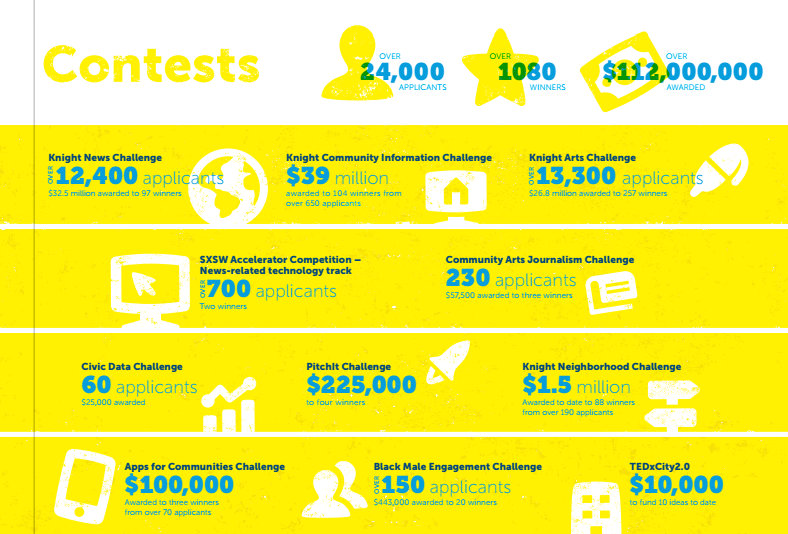
How the News Challenge changed the way we work on journalism and media innovation
I remember my first time sitting at the big wooden table in Knight Foundation’s boardroom. It was January 2008, years before I joined Knight, and I was there with other reviewers for the second year of the Knight News Challenge. I remember proposals from professional journalists and proposals from people who’d never met a professional journalist. I remember fellow reviewers who’d spent entire careers in newsrooms and reviewers who hadn’t yet had a career (I was one of those). No one quite agreed on what the future of journalism would look like. That was the point.
Disruption demands experimentation. That, in turn, demands flexibility and a willingness to quickly change structures and processes that aren’t working. Institutions tend to be bad at those things—at least at first. That’s as true for journalism institutions as it is for automakers. Our goal with the Knight News Challenge is to find the people who are inventing, support them and help them share their work, and in so doing help institutions find their way, too.
What exists today that didn’t when the News Challenge started in 2007 is a strong (and growing) network of innovative people—technologists, designers, entrepreneurs, reporters, editors—doing the sort of invention journalism needs to thrive. That network, more than any grant we’ve made, is what guarantees the future of our enterprise to help people learn about the world around them. For me, the News Challenge has been about learning to understand and support people, rather than projects. Our money, when it’s working well, keeps smart people working on tough problems, testing new solutions, throwing them out, and trying some more.
Knight recently released a great interactive report title “Why Contests Improve Philanthropy.” So, in that spirit, here’s my own list of reasons:
- People are the only constant on a project. If you support people who are agile and observant, you’ll get good stuff. Most contests focus almost exclusively on the project idea. We’ve repeatedly adjusted ours to focus more on the people. We ask for a video; we encourage online discussion on entries; we interview every finalist in person. You can tell a lot by how people interact with you, and with others, during the process.
- Being surprised is (almost always) awesome. Every time we pick a theme for the contest (“mobile,” “open government,” etc.) we get at least a dozen excellent submissions that don’t fit the concept we started with in our heads. We keep our challenge questions vague for this reason: We want people to read about our contest, think their idea fits even if we wouldn’t, and then convince us it does. That sort of idea—the one on the fringe—is often the most compelling, because it challenges the constraints we all create for ourselves.
- Contests are drivers of conversation. The potential of winning lots of money has, surprisingly, a tendency to get people’s attention. We’re trying to use each contest as an opportunity to get people talking—or continue a conversation that’s already started. For our last contest, on open government, we hosted events in 16 cities around the country to share our goals and brainstorm ideas. What we heard at those events helped shape the contest and our thinking about the field, and helped some applicants meet each other. We’re about to do another road tour, for our Knight News Challenge: Health, which starts Aug. 19.
It’s been five years since I first sat at Knight’s big wooden table. I’ve met hundreds more people, heard thousands of ideas and read more than 2,500 applications. We still don’t all agree on what the future of journalism looks like, but we want to keep the ideas coming.
Chris Sopher, journalism program associate at Knight Foundation
Knight and Case Foundation will sponsor a joint webinar for foundations and other organizations, “Designing Contests for Impact,” at 1 p.m. on Thursday, Aug. 8. Space is limited, so register early.
Recent Content
-
Journalismarticle ·
-
Journalismarticle ·
-
Journalismarticle ·


